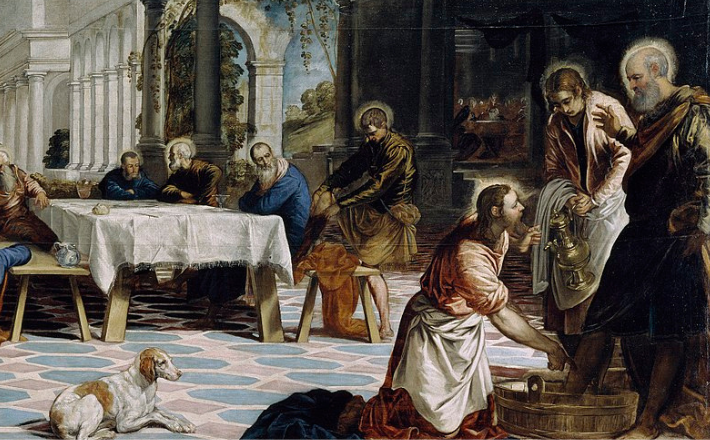Commentary on Psalm 116:1-2, 12-19
Maundy Thursday is all about remembering commandments—mandates (from the Latin mandatum)—that God has given to the worshiping community. As a complement to the stories of God giving instructions regarding Passover, Paul giving instructions regarding the Lord’s Supper, Jesus modeling service by washing feet, and the overarching divine command to love others, the reading from Psalm 116 voices the psalmist’s commitment to keep these commandments.
An overview of Psalm 116
Psalm 116 is one of the “Hallel Psalms,” a description that reflects the characteristic call to praise the Lord (Hebrew often uses the term hallelu-yah) that recurs in Psalms 113–118. This group of psalms is also characterized by frequent references to God’s deliverance of the Israelites, and especially the deliverance from Egypt, which likely accounts for the association of these psalms with the celebration of Passover.
The structure and content of Psalm 116 make it a thanksgiving psalm. Like others in this category of psalms, the psalm begins with an expression of gratitude, tells the story of how God has acted on behalf of the psalmist, and concludes with a renewed expression of gratitude or call to give thanks. Psalm 116 actually features repeated narrations of divine deliverance:
- God listened to the psalmist (verses 1–2)
- God saved the psalmist from a low place (verses 3–6)
- God delivered the psalmist from death (verse 8)
- God loosened the psalmist’s bonds (verse 16)
For the psalmist, God’s acts of hearing (verses 1–2) and defending (verses 6, 8) prove that God is gracious, righteous, and merciful (verse 5)—therefore worthy of the psalmist’s love, trust, worship, and obedience. The observation in verse 15 that God sees as “precious” the “death of his faithful ones” should not be understood as saying that God enjoys these deaths but rather that God considers the lives of those in the faith community to be precious. Their deaths are costly to God, which is yet another indicator of God’s worthiness to receive the worship and obedience of the psalmist.
The final section of the psalm (verses 12–19) is an extended promise the psalmist makes to God. Because of who God is and what God has done, the psalmist vows to offer sacrifices to God. This ritual involves lifting up the “cup of salvation,” which became a very literal part of the Jewish worship practices during the Passover meal.
Significantly, the psalmist’s offering of thanksgiving sacrifices is done in the presence of the whole community: in the presence of all God’s people (verses 14, 18), in the courts of the house of the Lord, in the middle of Jerusalem (verse 19). Telling the story of who God is and what God has done is part of worship, part of thanksgiving, and therefore part of the life of obedience to which God calls God’s people.
Psalm 116 and Holy Week
As with the other psalms that appear in the lectionary readings for Holy Week, Psalm 116 provides a kind of emotional-psychological soundtrack to the events the Gospels narrate. This psalm draws our attention forward to the promise of ultimate salvation that lies on the other side of Friday’s crucifixion.
Distress, anguish, affliction, and death are still ahead of us—both within the story of the passion and in the lives of those worshiping today—but we can find hope and inspiration in the confident testimony of the psalmist. The God of the past heard, cared, and delivered, so we can be sure that God will continue to do so. “Precious in the sight of the LORD is the death [and suffering] of his faithful ones” (verse 15), so we can be sure that God does not take our pain lightly. At the same time, the psalmist does not try to minimize the pain that has been experienced. This song-prayer is about resilience in the face of hardship and not about denial of hardship’s reality.
In Christian tradition, the Eucharist (from the Greek word eucharistia, “thanksgiving”) is an outgrowth of the Passover meal that included the “cup of salvation” associated with Psalm 116 and its promises to offer thanks and worship to the God who saves. The celebration of the Lord’s Supper in Christian worship—which is itself another commandment, or mandate, that Jesus gives to his followers—is therefore an echo of the kind of thanksgiving Psalm 116 exemplifies.
A model prayer
In preaching Psalm 116 on Maundy Thursday, one might consider embracing the role of the psalms as models for our own prayers. The psalmist of Psalm 116 goes through a process of remembering and naming challenging times, acknowledging and celebrating divine response, and worshiping and vowing obedience to God. The first-person language of the psalm invites us each to take on the psalmist’s voice and consider what stories, experiences, and promises we might have to share:
“I love the LORD because he has heard my voice and my supplications.” (verse 1)
- When have you cried out to God and received an answer of some kind?
- What prayers have you seen answered?
“What shall I return to the LORD for all his bounty to me?” (verse 12)
- What has God done for you that deserves thanks?
“I will … call on the name of the LORD; I will pay my vows to the LORD in the presence of all his people. … I will offer to you a thanksgiving sacrifice!” (verses 13–19)
- What vows can you make to God as a “thanksgiving sacrifice”?
- Who might need to hear your story?
- What can you do this week to obey God’s commands, which are summarized with “love God and love neighbor”?


March 28, 2024